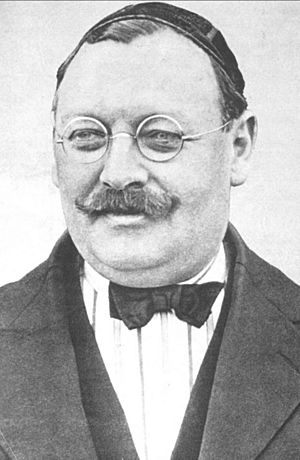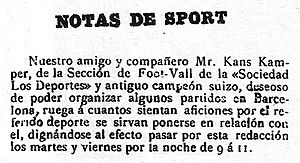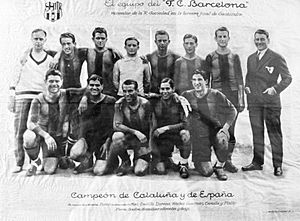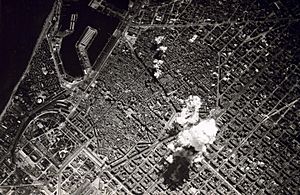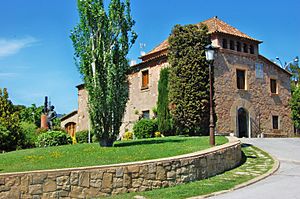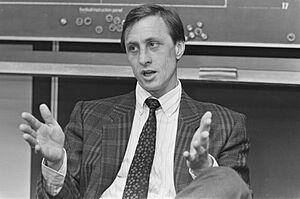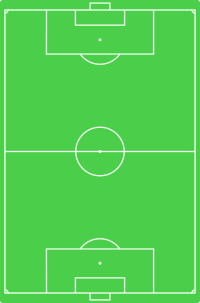History of FC Barcelona facts for kids
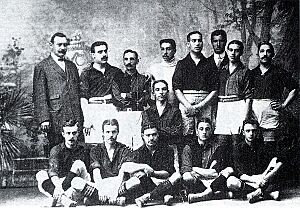
The story of Futbol Club Barcelona, often called Barcelona or Barça, began in 1899. A group of footballers from Switzerland, Catalonia, Germany, and England, led by Joan Gamper, started the club in Barcelona, Catalonia, Spain. For its first few years, the club played amateur football in local competitions.
In 1910, Barcelona started playing in European tournaments. Since then, they have won many UEFA trophies and even achieved a "sextuple," meaning they won six major trophies in one season! In 1928, Barcelona helped create La Liga, Spain's top football league. Barcelona is one of only three clubs that have never been relegated from La Liga, a record they share with Athletic Bilbao and Real Madrid.
Barcelona's history is also closely linked to politics. Even though foreigners founded the club, it slowly became a symbol of Catalan pride and values. When the government in Madrid became very strict in 1925, Catalonia felt more and more unhappy. Barcelona's stadium became one of the few places where people could show their feelings. When Francisco Franco banned the Catalan language, the stadium was one of the only places where people could speak it freely. Even after Spain became a democracy in 1978, the club remained a strong symbol of Catalan identity. In recent years, club leaders have continued to support important values like democracy and freedom of speech.
Contents
- How FC Barcelona Started (1899–1922)
- Tough Times and Success (1923–1957)
- Club de Fútbol Barcelona (1957–1978)
- Núñez and Stability (1978–2000)
- The Gaspart Era (2000–2003)
- The Laporta Era (2003–2010)
- The Rosell Era (2010–2014)
- The Bartomeu Era (2014–2020)
- The Return of Laporta and Post-Messi Era (2021–present)
- See also
- Images for kids
How FC Barcelona Started (1899–1922)
On 22 October 1899, Joan Gamper put an advertisement in a newspaper, saying he wanted to start a football club. Many people responded, and a meeting was held on 29 November 1899. Eleven players attended, and that's how Futbol Club Barcelona was born! The team's famous blue and red colors were first worn in a match in 1900. The club believes these colors came from a rugby team at a school attended by brothers Arthur Witty and Ernest Witty, who were important in Barça's early days.
Barcelona quickly became one of Spain's top clubs. In 1902, they won their first trophy, the Copa Macaya. They also played in the first Copa del Rey final that year, but they lost.
By 1908, the club was in trouble and almost went bankrupt. Joan Gamper stepped in as president. One of his biggest achievements was helping Barcelona get its own stadium, which gave the club a steady income.
On 14 March 1909, the team moved into the Camp de la Indústria, a stadium that could hold 8,000 people. To celebrate, they held a contest for a new club crest. Carles Comamala won, and his design is still used today, with a few small changes.
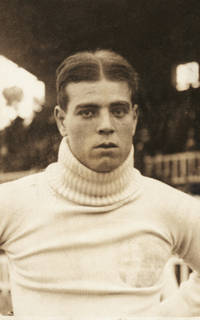
The new stadium helped the club grow a lot in the 1910s. Barcelona became a very strong team, winning many titles. They won three Catalan Championships in a row (1909–1911), three Copa del Rey titles (1910–1913), and four Pyrenees Cups (1910–1913). The Pyrenees Cup was an early international tournament for teams from Southern France, the Basque Country, and Catalonia.
During this time, the club also changed its official language from Spanish to Catalan. It became an important symbol of Catalan identity. For many fans, being part of the club was about more than just football; it was about being part of a shared identity. In 1913, Barcelona became the first club in Spain to allow women to become members.
Gamper worked hard to get more club members. By 1922, Barcelona had over 20,000 members, who helped pay for a new stadium. The club then moved to the new Les Corts stadium, which opened that same year. Les Corts started with a capacity of 22,000 and later grew to 60,000.
Gamper also hired Jack Greenwell as Barcelona's first full-time manager. Under Gamper's leadership, Barcelona won many trophies, including eleven Catalan Championships, six Copa del Rey titles, and four Pyrenees Cups. This period is known as the club's first "golden age."
Tough Times and Success (1923–1957)
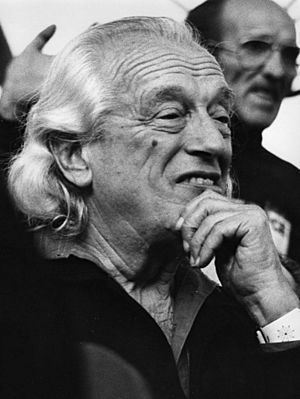
On 14 June 1925, during a time of strict government rule under Primo de Rivera, fans at the stadium booed the national anthem. As a punishment, the stadium was closed for six months, and Gamper had to leave his role as president. This was also when football became professional. In 1926, Barcelona's leaders officially said they were a professional football club.
In 1928, Barcelona won the Spanish Cup. A famous poet, Rafael Alberti, wrote a poem called "Ode to Platko" to celebrate the heroic performance of Barcelona's goalkeeper, Franz Platko. Two years later, on 30 July 1930, Joan Gamper passed away.
After this, the club went through a difficult period. Political problems in Spain overshadowed sports. Even though the team had great players like Josep Escolà and won the Catalan Championship several times in the 1930s, they struggled to win national titles.
When the Spanish Civil War began in 1936, some Barcelona players joined those fighting against the military uprising. On 6 August, the club president, Josep Sunyol, was sadly killed by soldiers. He became known as a "martyr" for Barcelona and Catalan identity. In 1937, the team toured Mexico and the United States, which helped the club financially. However, half the team stayed abroad, making it harder for Barcelona to win trophies.
On 16 March 1938, Barcelona was bombed from the air, and one bomb hit the club's offices. After Catalonia was taken over, the club faced many restrictions because it was a symbol of Catalan identity. The government banned the Catalan language and flag. The club was forced to change its name to Club de Fútbol Barcelona and remove the Catalan flag from its crest.
In 1943, Barcelona played against Real Madrid in the semi-finals of the Spanish Cup. Barcelona won the first match 3–0. Before the second match, a government official visited Barcelona's players and reminded them they were only playing because of the "generosity of the government." Real Madrid then won the second match by a huge score of 11–1.
Despite these challenges, CF Barcelona had great success in the 1940s and 1950s. In 1945, with Josep Samitier as coach and players like César and Ramallets, they won La Liga for the first time since 1929. They won two more league titles in 1948 and 1949. In 1949, they also won the first Latin Cup. In 1950, Barcelona signed Ladislao Kubala, who became a very important player for the club.
In 1951, after a match, fans left the stadium on foot, refusing to take trams. This was because there was a tram strike in Barcelona, and the fans supported it. Events like this showed that CF Barcelona was more than just a club; it represented the fight for rights and freedoms for many people in Spain.
Coach Fernando Daučík and player László Kubala led the team to win many trophies in 1952, including La Liga and the Copa del Generalísimo. They won these two trophies again in 1953.
Club de Fútbol Barcelona (1957–1978)
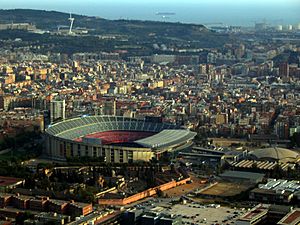
With Helenio Herrera as coach and talented players like Luis Suárez (who won European Footballer of the Year in 1960) and Hungarian stars Sándor Kocsis and Zoltán Czibor, the team won La Liga and the Copa del Rey in 1959. They won La Liga and the Fairs Cup in 1960. In 1961, they were the first club to beat Real Madrid in a European Cup match, but they lost the final to Benfica.
The 1960s were not as successful for Barcelona, as Real Madrid won most of the La Liga titles. The new Camp Nou stadium, finished in 1957, meant the club had less money to buy new players. However, players like Josep Maria Fusté and Carles Rexach emerged. The club won the Copa del Generalísimo in 1963 and the Fairs Cup in 1966. In 1968, Barcelona beat Real Madrid 1–0 in the Copa del Generalísimo final at Real Madrid's stadium, the Santiago Bernabéu, which brought some pride back to the club.
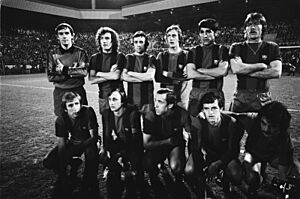
When Franco's strict rule ended in 1975, the club changed its official name back to Futbol Club Barcelona and put the Catalan flag back on its crest.
The 1973–74 season saw the arrival of a new star player, Johan Cruyff, who was bought for a world record fee. Cruyff quickly became a fan favorite. He famously said he chose Barcelona over Real Madrid because he didn't want to play for a club linked to Franco. He further won over fans by naming his son Jordi, a popular Catalan name. Alongside players like Juan Manuel Asensi and Carles Rexach, Cruyff helped the club win La Liga in 1974 for the first time since 1960. They even beat Real Madrid 5–0 at their own stadium! Cruyff was named European Footballer of the Year in 1973 and again in 1974 while playing for Barcelona.
Núñez and Stability (1978–2000)
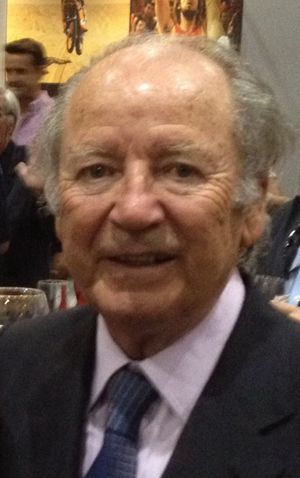
In 1978, Josep Lluís Núñez became the first elected president of FC Barcelona. From then on, club members have voted for the president. Núñez's main goal was to make Barcelona a top-class club, both on and off the field. He was president for 22 years. Núñez had strict rules about player wages and discipline. He even let go of famous players like Diego Maradona, Romário, and Ronaldo rather than meeting their demands.
On 16 May 1979, the club won its first UEFA Cup Winners' Cup by beating Fortuna Düsseldorf 4–3 in Switzerland. More than 30,000 Barcelona fans traveled to watch the final. That same year, Núñez started investing in the club's youth program. He turned an old farmhouse called La Masia into a place for young academy players to live and train. The name La Masia later became famous for Barcelona's youth system.
In 1982, Diego Maradona joined Barcelona for a world record fee. The next season, under coach César Luis Menotti, Barcelona won the Copa del Rey, beating Real Madrid. However, Maradona's time at Barcelona was short, and he soon left for Italy. In 1984, Terry Venables became manager and led the team to win La Liga. The next season, they reached the European Cup final but lost on penalties.
Around this time, some fan groups caused problems. The Boixos Nois group, which started with left-wing ideas, became more violent, causing trouble at matches.
After the 1986 World Cup, Barcelona signed English top-scorer Gary Lineker. But the team didn't achieve much success, and Terry Venables was fired in 1987. He was replaced by Luis Aragonés. The season ended with players protesting against president Núñez, but the team still won the Copa del Rey final.
In 1988, Johan Cruyff returned to the club as manager. He built a famous team known as the "Dream Team." This team included Spanish players like Pep Guardiola, José Mari Bakero, and Txiki Begiristain, as well as international stars like Ronald Koeman, Michael Laudrup, Romário, and Hristo Stoichkov.
About ten years after La Masia started, young players from the academy began playing for the first team. Pep Guardiola was one of the first famous graduates.
Under Cruyff, Barcelona won four La Liga titles in a row from 1991 to 1994. They also won the UEFA Cup Winners' Cup in 1989 and their first European Cup in 1992, thanks to a free-kick goal from Ronald Koeman. They also won a Copa del Rey, the European Super Cup, and three Spanish Super Cups. With 11 trophies, Cruyff became the club's most successful manager at that time. He also managed the club for eight years, the longest continuous period. However, in his last two seasons, he didn't win any trophies and had disagreements with president Núñez, leading to his departure.
After Cruyff left, Bobby Robson managed the club for one season in 1996–97. He signed Ronaldo and won three cups: the Copa del Rey, the UEFA Cup Winners' Cup, and the Supercopa de España. Despite this success, Robson was seen as a temporary manager.
Like Maradona, Ronaldo only stayed for a short time before leaving. But new stars like Luís Figo, Patrick Kluivert, Luis Enrique, and Rivaldo emerged. The team won a Copa del Rey and La Liga double in 1998. In 1999, the club celebrated its 100th anniversary by winning the La Liga title, and Rivaldo was named European Footballer of the Year. However, because they couldn't win the Champions League like Real Madrid, the manager and president Núñez resigned in 2000.
The Gaspart Era (2000–2003)
The departures of president Núñez and manager Louis van Gaal were less shocking to fans than the departure of Luís Figo. Figo, who was the club's vice-captain, was a hero to Catalan fans. Barcelona supporters were very upset when Figo decided to join arch-rivals Real Madrid. When he returned to the Camp Nou with Madrid, fans gave him a very hostile welcome, even throwing a piglet's head at him!
The next three years were difficult for the club, with managers coming and going. The club struggled in the league and in European competitions. In February 2003, the team was as low as 15th in the league. This led to the manager's resignation. At the end of the season, club president Joan Gaspart also resigned because of the club's poor performance.
The Laporta Era (2003–2010)
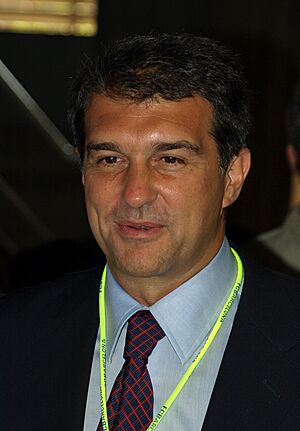
After the disappointing Gaspart era, a new young president, Joan Laporta, and a new young manager, former Dutch star Frank Rijkaard, helped the club recover. New international players like Ronaldinho, Deco, Henrik Larsson, Ludovic Giuly, Samuel Eto'o, and Rafael Márquez joined. They combined with talented homegrown Spanish players like Carles Puyol, Andrés Iniesta, Xavi, and Víctor Valdés. This mix of talent brought success back to Barcelona.
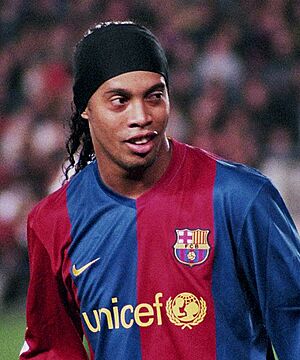
Rijkaard's Barcelona Team (2003–2008)
Barcelona won La Liga and the Supercopa de España in the 2004–05 season. Ronaldinho and Eto'o were voted among the top players in the world.
2005–06 Season
In the 2005–06 season, Barcelona won La Liga and the Supercopa again. A highlight was their 3–0 win over Real Madrid at the Santiago Bernabéu Stadium. Ronaldinho played so well that some Real Madrid fans even gave him a standing ovation! In the Champions League, Barcelona beat Arsenal 2–1 in the final. They were losing 1–0 with less than 15 minutes left, but they came back to win. Substitute Henrik Larsson helped set up goals for Samuel Eto'o and Juliano Belletti. This was the club's first European Cup victory in 14 years.
2006–07 Season
Despite being favorites, Barcelona didn't win any trophies in the 2006–07 season. A pre-season tour in the United States was blamed for many player injuries. There were also disagreements between players and the coach. In La Liga, Barcelona was in first place for most of the season, but Real Madrid eventually overtook them. They reached the Copa del Rey semi-finals but lost the second leg. They also lost in the final of the 2006 FIFA Club World Cup and were knocked out of the Champions League by Liverpool.
2007–08 Season
Barcelona finished the 2007–08 season third in La Liga. They reached the semi-finals of the Champions League and Copa del Rey, losing to the eventual champions in both. After a 4–1 defeat to Real Madrid, Joan Laporta announced that Barcelona B coach Pep Guardiola would take over as manager.
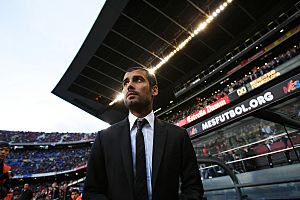
Guardiola's Barcelona Team (2008–2012)
2008–09 Season
Before the 2008–09 season, some club members tried to remove president Joan Laporta, but they didn't get enough votes. Laporta stayed and made big changes to the team, spending nearly €90 million on new players.
Barcelona played Real Madrid in El Clásico at the Santiago Bernabéu. Barcelona won the historic match 6–2, which was their biggest win in Madrid since the 1970s. On 6 May 2009, Barcelona played Chelsea in the Champions League semi-finals. After a 0–0 draw in the first game, Chelsea led 1–0 in the second game until Andrés Iniesta scored an equalizer in the 93rd minute. This sent Barcelona to the final. On 13 May, Barcelona beat Athletic Bilbao 4–1 to win the Copa del Rey for a record 25th time. Three days later, Real Madrid lost a league match, and Barcelona became La Liga champions.
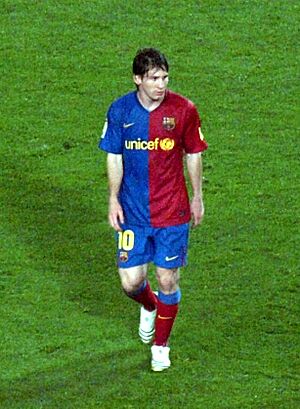
With a team mostly made up of players from their youth academy, La Masia, Barcelona defeated Manchester United 2–0 in the Champions League final in Rome on 27 May 2009. This completed the first "treble" ever won by a Spanish team, as they had already won La Liga and the Copa del Rey that season.
2009–10 Season
Barcelona went on to win the 2009 Supercopa de España and the 2009 UEFA Super Cup. This made them the first European club to win both domestic and European Super Cups after winning a treble. In December 2009, Barcelona won the 2009 Club World Cup. This meant they were the first team ever to achieve the "sextuple" (winning six trophies in one year). In May 2010, Barcelona won La Liga for the second time in a row, setting a new Spanish league record with 99 points.
The Rosell Era (2010–2014)
2010–11 Season
On 13 June, Sandro Rosell was elected president of Barcelona. Barcelona started the season by winning the 2010 Supercopa de España against Sevilla, winning 5–3 on aggregate. In the 2010–11 season, Barcelona had a slow start, even losing 2–0 at home to a newly promoted team. However, Barça recovered and had a magnificent 5–0 win over Real Madrid at home.
In the Champions League semi-finals against Real Madrid, Lionel Messi scored two goals to give Barcelona a 2–0 win in the first leg. The second leg ended in a 1–1 draw, sending Barça to the final against Manchester United. In the Copa del Rey Final against Real Madrid, Cristiano Ronaldo scored in extra time to win the cup for Madrid. However, Barça ended up beating Manchester United 3–1 in the Champions League final with goals from Pedro, Messi, and David Villa, winning their fourth Champions League title. Barcelona also won La Liga with 96 points, making it their third league title in a row.
2011–12 Season
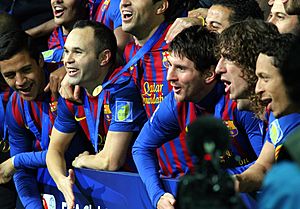
The 2011–12 season began with another Supercopa de España against Real Madrid. Barcelona won 5–4 on aggregate. In La Liga, Barcelona started strong with a 5–0 win. They won the first league Clásico 3–1 in Madrid. However, they later drew with Espanyol, falling behind Real Madrid in the league.
In the Copa del Rey semi-finals, Barcelona beat Real Madrid 2–1 in the first leg and drew 2–2 in the second, reaching the final. In the Champions League, they easily beat Bayer Leverkusen and Milan. However, in the semi-finals against Chelsea, Barcelona lost 1–0 in London and drew 2–2 at home, which eliminated them from the competition. In a crucial league game against Real Madrid, Barça lost 2–1, which helped Real Madrid win the league.
On 27 April, coach Pep Guardiola announced he would be leaving the club at the end of the season, saying he needed a break. He was replaced by Tito Vilanova. In Barcelona's final game of the season, the Copa del Rey final against Athletic Bilbao, Barça won 3–0, securing the trophy. That season, Barça also won the 2011 UEFA Super Cup and the 2011 FIFA Club World Cup.
2012–13 Season
Barcelona's 2012–13 season started with another Supercopa match against Real Madrid. Barcelona won the first leg 3–2 at home, but lost the second leg 2–1 away, losing the trophy on away goals. In La Liga, Barcelona quickly went to the top of the league. A highly anticipated Clásico ended in a 2–2 draw, with both Messi and Ronaldo scoring twice.
In the Champions League, Barcelona lost 2–1 to Celtic in Glasgow. They were later eliminated from Europe in the semi-finals by Bayern Munich, losing 7–0 on aggregate. This was the club's worst-ever aggregate loss in a European competition.
The Bartomeu Era (2014–2020)
2013–14 Season
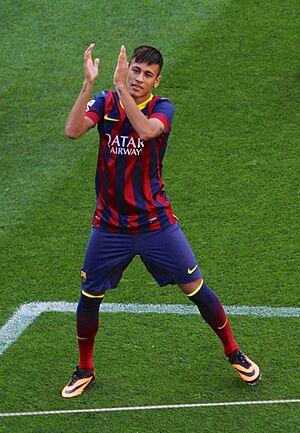
On 22 July 2013, Gerardo Martino became Barcelona's manager for the 2013–14 season. Barcelona won the 2013 Supercopa de España on away goals under Martino.
On 23 January 2014, Sandro Rosell resigned as president due to a complaint about the transfer of Neymar. Josep Maria Bartomeu replaced him.
In April 2014, FIFA banned the club from buying players for two transfer windows because they broke rules about signing players under 18. Barcelona appealed this decision.
On 17 May, Barcelona played their final game of the season against Atlético Madrid at the Camp Nou. Barcelona needed to win to become La Liga champions, while Atlético needed a draw. Barcelona led 1–0, but Atlético scored to make it 1–1, winning their first league title since 1996.
2014–15 Season
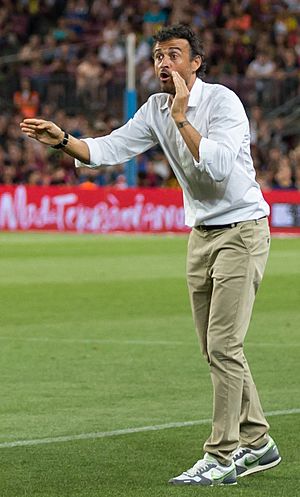
On 19 May 2014, it was announced that Luis Enrique would return to Barcelona as head coach. After his arrival, Barcelona broke their transfer record by paying a large fee for striker Luis Suárez.
In late 2014, Barcelona's appeal against the transfer ban was rejected, meaning they couldn't sign players in 2015. On 5 January 2015, the sporting director was fired.
Barcelona won the treble in the 2014–15 season, winning La Liga, Copa del Rey, and the UEFA Champions League. This made them the first European team to win the treble twice! On 17 May, they won their 23rd La Liga title. On 30 May, they defeated Athletic Bilbao in the Copa del Rey final. On 6 June, Barcelona won the Champions League final with a 3–1 win against Juventus, completing their second treble in six years.
2015–16 Season
Barcelona started their 2015–16 season with a thrilling 5–4 win against Sevilla in the 2015 UEFA Super Cup. Pedro scored the winning goal in extra time. However, Barcelona lost the 2015 Supercopa de España to Athletic Bilbao, losing 5–1 on aggregate.
Despite some player departures, Barcelona successfully defended their league title, winning 3–0 against Granada on the final day. Luis Suárez scored all three goals. Barcelona also won the 2015–16 Copa del Rey with a 2–0 win against Sevilla in the final. They also won the 2015 FIFA Club World Cup with a 3–0 win against River Plate.
In the UEFA Champions League, Barcelona finished first in their group without losing. They beat Arsenal in the Round of 16. However, they were knocked out in the quarter-finals by Atlético Madrid, losing 3–2 on aggregate.
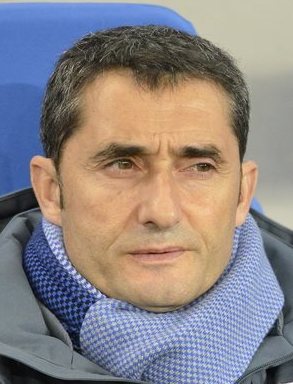
2016–17 Season
On 27 June 2016, Brazilian player Dani Alves left Barcelona for Juventus. On 25 August 2016, Manchester City signed goalkeeper Claudio Bravo. Barcelona signed Samuel Umtiti and Paco Alcácer during the summer transfer window. They also signed Dutch goalie Jasper Cillessen as a backup.
Barcelona won the 2016–17 Copa del Rey, defeating Deportivo Alavés 3–1 in the final. However, they couldn't defend their league title, finishing 3 points behind Real Madrid.
Barcelona's European campaign was exciting. They started the 2016–17 UEFA Champions League with a 7–0 win over Celtic, with Lionel Messi scoring three goals. They finished first in their group. In the Round of 16, Barcelona faced French club Paris-Saint Germain. They shockingly lost the first leg 4–0 in France. But in the second leg, Barcelona achieved an incredible 6–1 win, meaning they won 6–5 on aggregate and moved to the quarter-finals. This match was called "La Remontada" (The Comeback) by the Spanish media. Despite this amazing comeback, Barcelona were knocked out in the quarter-finals by Juventus, losing 3–0 on aggregate.
2017–18 Season
On 1 March 2017, Luis Enrique announced he would leave Barcelona at the end of the season. On 29 May 2017, FC Barcelona announced that Ernesto Valverde would be the new manager. Brazilian star Neymar, who scored two goals in the "remontada" against PSG, left for the French side for a world record fee of €222 million. As a replacement, Barcelona signed French striker Ousmane Dembélé. During the winter transfer window, Barcelona signed Philippe Coutinho and sold Javier Mascherano.
Barcelona's first game of the 2017–18 season was a 3–1 loss to Real Madrid in the first leg of the 2017 Supercopa de España. They lost 5–1 on aggregate. Despite this, Barcelona won "the Double," winning both La Liga and the Copa del Rey. They almost went unbeaten in the league, losing only once. They won the 2018 Copa del Rey Final with a 5–0 victory over Sevilla. In the 2017–18 UEFA Champions League, Barcelona were knocked out in the quarter-finals by Roma. They lost 3–0 in the second leg, and Roma won on away goals after a 4–4 tie.
The 2017–18 season was Andrés Iniesta's last at FC Barcelona, as he left for a Japanese club. Barcelona signed Chilean midfielder Arturo Vidal as a replacement.
2018–19 Season
Barcelona won their first game of the 2018–19 season, the 2018 Supercopa de España against Sevilla, which was held in Morocco. This was the first time the Supercopa de España was played outside of Spain. Barcelona also secured their 26th La Liga title during the 2018–19 season with a 1–0 win against Levante. However, they were knocked out of the 2018–19 UEFA Champions League in the semi-finals by Liverpool. For the second year in a row, Barcelona lost after having a three-goal lead from the first leg. They won the first leg 3–0 at home, but Liverpool won 4–0 in the second leg, winning 4–3 on aggregate. Barcelona also lost the 2019 Copa del Rey Final 2–1 to Valencia.
2019–20 Season
On 13 January 2020, after losing to Atlético Madrid in the Spanish Supercup, Quique Setién became the new head coach of Barcelona. Barcelona was leading the league when the COVID-19 pandemic stopped the competition. When it restarted, their performance dropped, and they lost the league title to Real Madrid on 16 July.
In the Champions League, Barcelona suffered one of their worst defeats in history, losing 8–2 against Bayern Munich in the quarter-finals. Barcelona finished the season without any trophies for the first time in 12 years.
The Return of Laporta and Post-Messi Era (2021–present)
2020–21 Season
On 17 August, the club announced that Setién had been removed as manager. Two days later, Ronald Koeman was appointed as the new head coach.
Fans were increasingly unhappy with the club's financial problems and poor performance. On 27 October 2020, Josep Maria Bartomeu resigned as president.
On 7 March 2021, Joan Laporta was elected president of Barcelona again. In the Champions League, Barcelona were knocked out by Paris Saint-Germain in the Round of 16. Barcelona won a record 31st Copa del Rey, their only trophy under Koeman, after defeating Athletic Bilbao 4–0 in the final. Barcelona finished the 2020–21 season third in La Liga, their lowest league position since 2008.
2021–22 Season
In August 2021, Barcelona faced serious financial problems. They announced a huge club debt and a very high wage bill. Negotiations to re-sign Lionel Messi, whose contract was ending, had been ongoing. However, on 5 August 2021, Barcelona announced they could not re-sign Messi due to league rules. This was despite the club and Messi agreeing on a new contract. Messi left the club after 21 years as a Barcelona player and the club's all-time leading goalscorer. He signed with Paris Saint-Germain for free. The financial issues also limited Barcelona in the transfer market, so most new players joined for free or on loan. The club also had to reduce player wages.
Poor performances in La Liga and the Champions League led to Ronald Koeman being fired on 28 October. Club legend Xavi replaced him. Xavi couldn't turn things around in the Champions League, and Barcelona dropped into the Europa League for the first time since 2004. They were later knocked out in the quarter-finals. In the league, Xavi greatly improved Barcelona's form, guiding them from ninth to second place, which secured a Champions League spot for next season. However, Barcelona finished the season without any trophies.
2022–23 Season
On 1 July 2022, the stadium was officially renamed "Spotify Camp Nou" after a sponsorship deal. This was the first time in the club's history that the stadium's naming rights were sold.
On 15 January 2023, Xavi led Barcelona to their first trophy since the 2021 Copa del Rey. The team defeated Real Madrid 3–1 in the Supercopa de España final.
2023–24 Season
See also
 In Spanish: Anexo:Historia del Fútbol Club Barcelona para niños
In Spanish: Anexo:Historia del Fútbol Club Barcelona para niños
Images for kids
 | Delilah Pierce |
 | Gordon Parks |
 | Augusta Savage |
 | Charles Ethan Porter |


